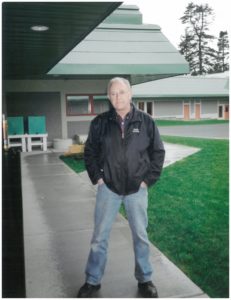If you’re in Criminal Justice at Camosun College, you’ve probably read Gordon Cruse’s Juvie, which is a mandatory text in the program. Good news for those who liked what they read: Cruse—a local author and former juvenile detention guard of 26 years—has a new book out, called Handcuffed by History.
In this book, he delves into the lives of young offenders as they get older, examining what they have done since they were in juvenile detention. He also addresses issues relating to the criminal justice system, a shortage of social workers needed to assist vulnerable youth, and his time spent working as a juvenile detention guard. And the Camosun connection continues: proceeds from the sales of Juvie and Handcuffed by History provide bursaries, in memory of Reena Virk and Kimberly Proctor, to Camosun students.

Cruse says that most of the interviews he did for the book were in Western Canada, and, even though he tried to get females to be in it, they’re all with men.
“It’s a fairly sensitive subject; it means something to them to be in the book, and they’ve told me that,” says Cruse. “In their words, these people tell me what path their life has taken since leaving young offender status and the crimes of their teen years. About two-thirds of the young men are able to turn their lives around; some are still in jail, some have went into what I would call a mainstream kind of lifestyle, and some of them are surprisingly accomplished.”
Cruse has been a foster parent since 1973, so he has lots of experience with social workers and other foster parents. However, he admits that he was a bit thrown off by some of the interviews he conducted for Handcuffed by History; some of the interviewees had committed horrible acts of violence and were telling Cruse their tales. In an attempt to come at these youth offenders from an understanding point of view, Cruse heard dozens of anecdotes and details of the sad upbringings that some of the interviewees endured as children.
“These people committed all kinds of crimes, from shoplifting a chocolate bar or a sweater to murder,” says Cruse. “One afternoon, in the late ’90s, I was supervising a group of kids in arts and crafts, one girl, seven boys. I looked around and thought to myself, ‘Gord, you are the only person in here who hasn’t killed someone,’ and that fact just blew me away. Some of the torturous lifestyles they had to live when they were kids might have contributed to their decision-making. One kid said to me, ‘My dad used to really be rough and hard on my mom. She was a really heavy lady and he made her climb up a steep, rocky hill in the winter to take drugs up to a meth lab that was hidden up in the trees.’”
Cruse witnessed firsthand both the good and the bad sides of young inmates during his time as a former juvenile detention guard. He has watched with a warm heart as some of these inmates blossom into productive and law-abiding members of society.
“Some of these people, they’ve done some pretty amazing things after leaving juvie,” he says. “It’s not all a gloomy picture. I thought the most important thing I could do when I was at juvie was just to listen to the kids. I got called a few nasty names, and occasionally I would have to break up a fight, but the bottom line is where are they now, what happened to them, what effect has life in the centre had on them?”
